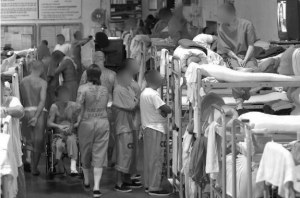In last week’s piece on the case of Brown v. Plata and the overcrowding of California’s prisons, the previous writer asserted that the people of California will be exposed to more threats that before “… because five individuals […] decided that the medical care provided to criminals was inadequate.” As if some rogue band of terrorists was breaking open the prisons of The Golden State just because a couple inmates had the sniffles. This is not only rhetorically misleading, it is factually wrong. The Supreme Court has ordered California to reduce its prison population to a mere 137.5% of maximum capacity, citing that the dangers to personal health due to overcrowding violated their 8th Amendment rights.
Before we get too far into this debate, let’s lay out a few assumptions. First, that all prisoners in the California prison are guilty of their crimes. Second, that the punishments for those crimes are just and that they should serve them. Third, that these prisoners are a danger to society. All of these assumptions are, if not wrong, at the very least highly controversial. But let’s accept them for now.
Even under these assumptions, we cannot keep these prisoners contained in overcrowded facilities. Our society, our government, our nation are all bound by the rule of law. Contracts agreed upon between individuals and parties, between the people and the government, are sacrosanct and must be followed. One specific contract, the Constitution, stands above all others, and its 8th Amendment specifically bans “cruel and unusual punishment.” The previous writer appears to be under the impression that denial of medical care does not fall under this distinction. Or that the denial of medical care was so limited that the reaction by the Supreme Court was not in due proportion or that it exceeded their rights to do so as a court (Precedent disagrees, see Hutto v. Finney, 437 U. S. 678, 687, n. 9).
At this point, it would be appropriate and fitting for me to argue how we have a duty to uphold the rights of all American citizens, especially those in prison who are the ones most stripped of society’s usual protections. I could easily fill this space with anecdotes and studies of the lack of mental health facilities and hospital care in prison, of the prisoners who have died because of inadequate care, of the prisoners who are still waiting for hospital beds they may never get to, of the unsanitary conditions of overcrowded prisons , of the riots caused by overcrowding, of the prison rapes that happen at inexcusably high levels because we have too few guards for too many inmates, or even of how prisons with too few guards and too little resources for rehabilitation only harden prisoners and make recidivism even more likely.
Alternatively, I could argue on the logical fallacies of the previous writer’s opinion. For instance, his comparison of an overcrowded prison to a trailer home I found particularly distasteful. Yes, people do live in such cramped quarters outside of prison, but they’re not locked in there all day and they do choose who they get to live with.
I could even argue about the larger issues of prison reform. Like how our incarceration rate, which only 40 years ago stood at the same percentage of countries of similar living standards, yet these days is 6-8 times as high as countries most similar to us (our rate is 800 per 100,000. Australia’s is 133, Canada’s 110, England’s 154, New Zealand’s 203, Europe’s average is 105). Or, how the War on Drugs incarcerates a significantly higher number of blacks than whites and forces non-violent offenders to serve hard time side by side with murderers.
I could argue all of these, yet I am nearly out of space, and I’ve barely introduced any of them. So let me present you, dear reader, with the three options available to California. 1) It acknowledges that its prisons are massively overcrowded and spends vast amounts of money that it does not have building new prisons and staffing them. I’m sure the previous writer would pen many thrilling opinions strongly supporting the new taxes necessary to pay for it. 2) The prisons slash their populations, releasing non-violent offenders back into society. 3) The state of California, and by extension, the people of the United States, decides that no, not all men are equal under the law, and if you’re in prison, tough luck, your right to humane punishment has been revoked.
I am no fan of solution number one. I feel it would be a waste. But at the same time, I cannot abide, and so it seems neither can a majority of the Supreme Court, solution three and the arbitrary curtailing of Constitutional rights. Therefore, it is the opinion of this writer, and of the Supreme Court, that the prison population of California must be decreased.
Billings is a member of the class of 2013, a friend of Adam Ondo, and strongly encourages everyone to read the 91 page Supreme Court opinion on Brown v. Plata.






